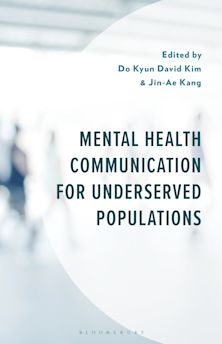- Home
- ACADEMIC
- Communication Studies
- Health and Science Communication
- The Rhetoric of Breast Cancer
The Rhetoric of Breast Cancer
Patient-to-Patient Discourse in an Online Community
The Rhetoric of Breast Cancer
Patient-to-Patient Discourse in an Online Community
This product is usually dispatched within 1 week
- Delivery and returns info
-
Free CA delivery on orders $40 or over
You must sign in to add this item to your wishlist. Please sign in or create an account
Description
More and more women are searching the Internet for medical information. Women who have been diagnosed with breast cancer search for information and participate in online communities—groups that “gather” in established online spaces to interact about their diagnoses of breast cancer. They share their own struggles and emotions with their own language: the rhetoric of breast cancer. They ask questions, share experiences, create friendships, discuss their disease processes, and present their illness narratives. However, they also create ethical dilemmas for online researchers and privacy issues as they share information that is legally protected through HIPAA.
Online communities will only increase as research of online information expands through big data and predictive analytics, and more than ever before, women need to be aware of the information they share. Researchers also need to be aware, as they share the data they gather, and seek to preserve the privacy of the creators of the online data that they investigate and report.
The Rhetoric of Breast Cancer provides a discussion of the complex structures of online communities, particularly those focused on medical diagnoses, and is a valuable read for patients, theorists, physicians, and researchers.
Table of Contents
Introduction
Chapter One: Online Communities and Patient Discourse
Chapter Two: The Rhetoric of Breast Cancer
Chapter Three: Patients, Medical Care, and Rhetoric
Chapter Four: Concerns Related to Privacy, Online Disclosure, and Ethics
Chapter Five: Big Data and the Rhetorics of Health and Medicine
References
About the Author
Product details
| Published | Sep 22 2017 |
|---|---|
| Format | Hardback |
| Edition | 1st |
| Extent | 190 |
| ISBN | 9781498552448 |
| Imprint | Lexington Books |
| Illustrations | 1 BW Photo, 1 Table |
| Dimensions | 238 x 158 mm |
| Series | Bloomsbury Studies in Health Communication |
| Publisher | Bloomsbury Publishing |
About the contributors
Reviews
-
King is a powerful voice for the patient-side of medicine. She provides thought-provoking and timely information about the unintended consequences of sharing medical information in online communities and brings to light the potential harm to patients in the age of big data.
Brenda Sims, University of North Texas
-
The Rhetoric of Breast Cancer: Patient-to-Patient Discourse in an Online Community is a deeply moving account of the language, symbols, and digital texts that breast cancer patients use to share information and support each other in an online community. Although the book’s specific focus is online patient communication in a specific patient forum devoted to breast cancer, this book’s findings about patient-to-patient communication will be of interest to anyone who is, has been, or knows a patient diagnosed with a serious condition. King’s writing is compelling, and the book is extremely well researched. She has managed to achieve scholarly rigor in a text that will reach a wide audience because its prose is so compelling. It is the rare scholarly text that can meet both of these standards, but King has definitely achieved this.
Amy Koerber, Texas Tech University
-
The Rhetoric of Breast Cancer: Patient-to-Patient Discourse in an Online Community offers a compelling case for ’s argument that “patient voices matter.” In her case study of an online breast cancer patient community, King draws out the often overlooked rhetorical strategies patients use when communicating with each other. In doing so, she expertly weaves together a narrative of the rhetoric of breast cancer as a generative language of interaction. The Rhetoric of Breast Cancer is a thought-provoking and engaging read for anyone interested in the rhetoric of health and medicine, the language of breast cancer, and the ethics of doing such online research.
Lora Arduser, University of Cincinnati
-
In The Rhetoric of Breast Cancer: Patient-to-Patient Discourse, King painstakingly presents a deeply impressive snapshot of women's breast cancer discourse. Her work is methodical and textured, revealing the rhetoric surrounding breast cancer between patients in one online space. Ethically scrupulous, other researchers in the rhetoric of health and medicine (and researchers, in general), will benefit from King's meticulous discussion of research ethics in digital spaces. As researchers endeavor to understand patient-to-patient discourse in online spaces and analysts mine the Internet's data to predict trends, behavior, and outcomes, King's work includes especially salient, timely discussions.
Kristin Bivens, Harold Washington College

































